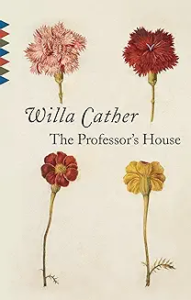The Professor’s House by Willa Cather 1925
Cather is a fascinating figure. Born in 1873 and raised in rural Nebraska, she early on showed great writing skills and moved to New York where she had a successful career on the editorial staff of McClure’s magazine. Her friend and mentor, Sarah Orne Jewett of “The Country of the Pointed Firs” encouraged her to write fiction, and Cather turned out 12 novels, 8 short story collections and two books of poetry. She was awarded the Pulitzer Prize in 1923 for “One of Ours.”
“The Professor’s House” is generally not thought to be the equal of her more famous novels, “O, Pioneers!”, “Death Comes to the Archbishop”, and “My Antonia”, and having read the latter two, I would agree. The book is divided into three parts, The Family, Tom Outland’s Story, and the Professor, and the transitions just didn’t work for me. The section on Outland, who moved to New Mexico after being orphaned and who tells the story of discovering undisturbed ancient Native American ruins in a mesa’s canyon while working as a cowboy. Outland figures prominently in the other sections. He was the Professor’s student at the university in Hamilton (a fictitous town on Lake Michigan) and was engaged to his older daughter. He invented and patented a new engine which yielded significant wealth which he never enjoyed since he was killed early in WWI when he volunteered for the French Foreign Legion. His fiance then married Louie Marcellus whose opulent lifestyle and wealth from the patent his wife inherited carried with it a hint of anti-semitism. The final chapter has the Professor, at the age of 52, questioning the meaning of his life and his scholarship, yearning for the simplicity and innocence of his youth.
My difficulty with the novel, I believe, mirrors Cather’s own difficulty in deciding what the primary story was. Is it the Professor’s mid-life crisis? Is it the money based conflicts that beset the Professor’s daughters and his relationship with his associate Dr. Crane? Is it Tom’s mystical experience in the desert ruined by the intrusion of the financial dealings of his partner, Roddy, and where, by the way, did that Roddy disappear to?
This is a bit of a mishmash of a novel, though Cather’s writing skill especially in her descriptions of the characters’ physical features shines through. If you’re moved to read Cather, and I hope you are, read “My Antonia” which I think is her best book.



